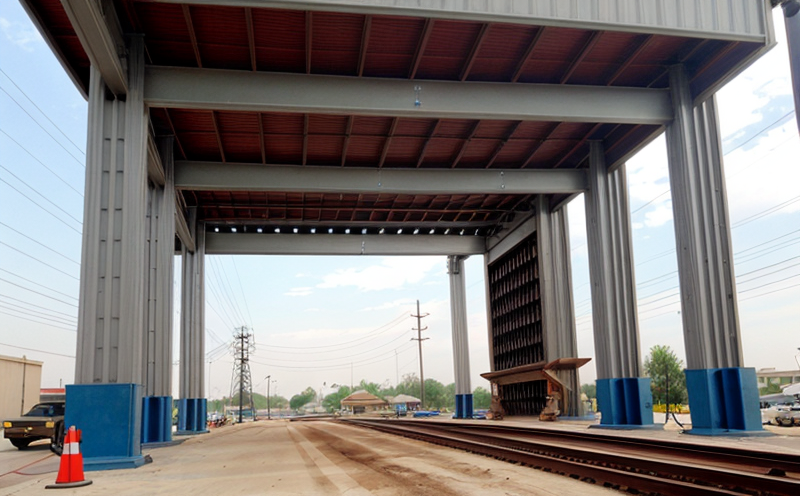ASTM D790 Flexural Testing of Composite Materials
The ASTM D790 standard provides a comprehensive guide to the flexural testing of plastic materials, including composites. In this service, we specialize in performing ASTM D790 flexural tests on composite materials used within the aerospace and aviation sectors. This service is crucial for ensuring that these materials meet stringent mechanical integrity requirements.
Composite materials are favored in aerospace and aviation due to their high strength-to-weight ratio. However, it's essential to verify that they perform consistently under stress without compromising safety or performance. The ASTM D790 test provides a standardized method to evaluate the flexural properties of these materials, ensuring reliability across various environmental conditions.
The testing process involves subjecting specimens to controlled bending forces until failure occurs. This allows for the determination of key mechanical properties such as flexural strength and modulus. These parameters are critical in aerospace applications where even minor material weaknesses can have significant implications for structural integrity.
Our laboratory adheres strictly to ASTM D790 procedures, ensuring accurate and consistent results. The test involves precise specimen preparation, calibration of testing equipment, and data analysis to meet the specified requirements. Our technicians are trained according to industry best practices, allowing us to deliver reliable outcomes that can influence design decisions and compliance.
The importance of this service extends beyond mere quality assurance; it plays a pivotal role in advancing technology within the aerospace sector. By adhering to international standards like ASTM D790, manufacturers can ensure their products are not only compliant but also optimized for performance under real-world conditions.
In summary, ASTM D790 flexural testing of composite materials is an indispensable tool in ensuring the reliability and safety of components used in aerospace applications. This service helps maintain high standards of quality and compliance, contributing to the overall success of projects within this sector.
Why It Matters
The significance of ASTM D790 flexural testing cannot be overstated in the aerospace and aviation industries. Ensuring that composite materials meet strict mechanical integrity requirements is paramount for safety and performance. Flexural strength and modulus are critical properties that influence the overall durability and reliability of aircraft components.
Failure to adhere to these standards can lead to catastrophic failures, posing a direct threat to human life and operational efficiency. By conducting ASTM D790 tests, manufacturers and quality assurance teams can mitigate risks associated with material performance variations. This testing ensures that every part meets the necessary criteria before being integrated into larger systems.
The aerospace industry is highly regulated, requiring compliance with multiple international standards including ISO, EN, IEC, and ASTM. Adhering to these guidelines not only enhances product quality but also supports regulatory compliance. Our laboratory offers a robust framework for meeting these requirements through precise testing methods and stringent quality controls.
Moreover, the results from ASTM D790 tests provide valuable insights into material behavior under stress. This information is invaluable for continuous improvement in design processes, allowing manufacturers to innovate without compromising safety or performance standards.
In conclusion, ASTM D790 flexural testing is essential for maintaining high-quality standards within the aerospace and aviation sectors. By prioritizing this service, organizations can ensure they are producing reliable components that meet both regulatory expectations and engineering needs.
Competitive Advantage and Market Impact
The ability to perform ASTM D790 flexural testing on composite materials offers significant competitive advantages in the aerospace and aviation industries. By ensuring compliance with international standards, organizations can demonstrate their commitment to quality and safety, which is increasingly becoming a deciding factor for customers.
Our laboratory's expertise in this area allows us to offer services that go beyond mere compliance; we provide actionable insights based on test results. These insights enable manufacturers to optimize designs while maintaining stringent performance criteria. This proactive approach helps companies stay ahead of the curve, ensuring they are always meeting or exceeding customer expectations.
Furthermore, the rigorous testing process ensures that products perform consistently across different environments and conditions. This consistency is particularly important in aerospace applications where variability can have severe consequences. By achieving this level of reliability, our clients gain a competitive edge by offering more trustworthy solutions to their customers.
The demand for innovative materials continues to grow as industries seek lighter, stronger alternatives that enhance performance while reducing weight. Our ASTM D790 testing services contribute directly to fostering such innovation by providing reliable data that supports the development of new composite materials and applications.
In summary, our laboratory's focus on ASTM D790 flexural testing not only enhances product quality but also drives market leadership through consistent performance and safety standards. This commitment ensures that our clients remain competitive in an ever-evolving industry landscape.
Use Cases and Application Examples
| Application | Description | ASTM D790 Test Parameters |
|---|---|---|
| Airframe Structures | The primary load-bearing components of an aircraft. | Flexural strength, modulus of rupture, and deflection at break. |
| Rotor Blades | Components that experience cyclic loading during operation. | Flexural strength and fatigue testing under bending conditions. |
| Turbine Blades | High-performance components used in jet engines. | Flexural strength and modulus of rupture at elevated temperatures. |
| Fuselage Panels | Structural elements that must withstand aerodynamic forces. | Flexural strength, deflection under load, and impact resistance. |
| Rudder and Elevator Surfaces | Control surfaces for directional stability. | Flexural strength and modulus of elasticity at low temperatures. |
| Propeller Blades | Mechanical components that must endure high rotational speeds. | Flexural fatigue testing under dynamic loading conditions. |
The ASTM D790 flexural testing service is integral to these applications, providing crucial data on the mechanical properties of composite materials. This information helps manufacturers optimize designs for better performance and reliability while ensuring compliance with industry standards.
Our laboratory's expertise in this area ensures that we can provide accurate and reliable results, contributing directly to the success of our clients' projects. By leveraging ASTM D790 testing, organizations can ensure they are meeting or exceeding both regulatory requirements and customer expectations.





